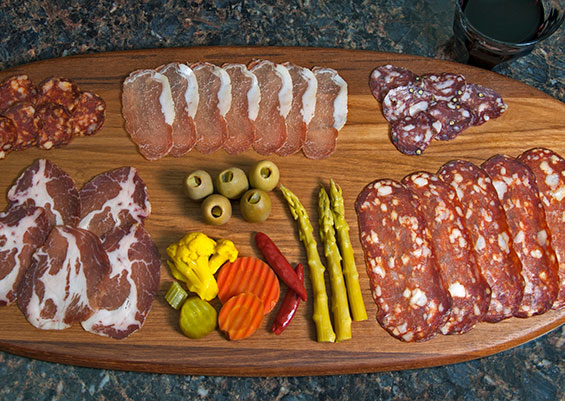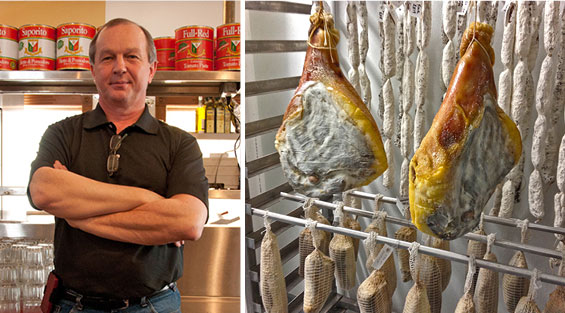
An interview with Chef Daniel Carr of Visconti’s reveals his passion for crafting authentic salumi. The centuries-old European craft of salting and curing meats was barely practiced in this country until during the past decade or so when a few intrepid restaurateurs and chefs—like owners Daniel Carr and Candy Mecham of Visconti’s Restaurant Group in North Central Washington—realized that consumers were as hungry and eager for local artisan cured meats as they were passionate about producing them.
With a combined seventy years of experience in the restaurant game between them, Carr and Mecham’s quest to produce traditional style salumi was a logical extension of Visconti’s slow food-themed Italian restaurants.
Ultimately their success led to the launch of an Italian market, called Cured, which opened its doors in Leavenworth in 2008. Cured is a purveyor of not only their in-house savory artisan salumi, but hard-to-find delicacies like pickled quail eggs and assorted imported cheeses, wines, olive oils and gourmet foods.
Today, Cured produces all of the cured meats for Visconti’s Restaurants (located in Wenatchee and Leavenworth), with the exception of prosciutto due to the high volume.
Carr is a connoisseur of fine wines and longtime, stalwart supporter of the local wine industry. His restaurants have won multiple awards for their deep Washington wine list, and he has been involved as a judge every year at the North Central Washington Wine Awards.

What sparked your interest in producing cured meats?
Chef Daniel Carr: A trip to Italy and Candy. We fell in love with the incredible cured meats that you would find in every town or village. When we came home and could not find this quality here, her constant question was, “Why can’t you make this here?” We refused to accept that we could not have the same quality of ingredients as we experienced every day on our trip.
Do you refer to your cured meat products as salumi or charcuterie?
Chef Daniel Carr: Salumi. The Italian word salumi encompasses all cured meats, whole muscle (prosciutto, speck, etc.) or ground muscle (salami, etc.) that are salt “cured” and/or dried, and/or sometimes smoked to preserve it for future use. The French call this charcuterie. All salami is salumi, but not all salumi is salami.
What are the notable differences between your Old World style salumi versus mass-produced cured meats?
Chef Daniel Carr: Quality ingredients are a must; the pork used in salumi needs to be fed a special diet, usually high protein and low carb. We do not use a meat grinder; instead we use a bowl cutter that employs high-speed knives (that do not smear the fat or crush the meat) for perfect texture in the bite and excellent eye appeal. Lastly, recipes, methods of production, and aging are all followed with the goal of imitating Old World traditions.
It sounds complicated.
Chef Daniel Carr: It’s so uncomplicated, it’s complicated. If you don’t have the passion for it, you won’t make it.
What types of pork and special feed do you use?
Chef Daniel Carr: We use Berkshire-cross breeds and European style Heritage Yorkshire. For instance, we produce our capicola dolce using hazelnut-finished Berkshire pork. The hazelnut diet sweetens the meat. The fat is whiter than driven snow and the texture is amazing. In fact, the fat is almost greaseless compared to commodity pigs fed on regular carbohydrate feeds.
Do you call your capicola dolce because of the delicate sweet character?
Chef Daniel Carr: Yes, I prefer to call it dolce because I want the sweetness of the meat to prevail, similar to prosciutto. We treat it more like a prosciutto than traditional capicola.
You mentioned that you were inspired to learn the Italian technique of cooking “by feel” some years ago. Where did you draw inspiration for making salumi?
Chef Daniel Carr: Paul Bertolli, who had an Italian restaurant in Oakland, Calif, was an inspiration. He started a company called Fra’ Mani. He is one of a handful of people that was really influential. He wrote a cookbook, Cooking by Hand, that really sums up his philosophies. I’ve read every cookbook he’s ever written. He has that passion like a true Italian—it’s more than just cooking. I can get pretty geeky on this subject. (Laughs.)
Let’s talk wine. What is the backstory to your award-winning wine list at the restaurants?
Chef Daniel Carr: There were eight wines on the wine list in the early ‘90s, mostly California. Candy and I both loved wine and started checking out wineries together. We had met an importer distributor in Seattle who came back to the restaurant a week later with a trunk full of Italian wines and all of a sudden our wine program started growing on the sales side. It was exponential.
So then we started working with Washington wines. We made a trip to Walla Walla in ’94 and met Tom Waliser (now of Beresan Winery) who was one of the original owners of Pepper Bridge. Tom and I go way back, and he had known Candy through the apple industry in Wenatchee. He introduced us to the Figgins (Leonetti), Rick Small (Woodward Canyon), Marty Clubb (L’Ecole) and the McClellans (Seven Hills Winery). That became our nucleus.
Within a year we were carrying all their wines—and it just started growing from there. In 2001 we peaked with a cellar of 6,000 bottles that represented about 1,000 selections on the wine list of solely Washington and Italian wines. I don’t know how I managed to stay on top of the inventory between the two restaurants, but it was a blast.
Give me a snapshot of your wine program at this moment.
Chef Daniel Carr: Our current wine menu sits around 160 Washington wines and 140 Italian wines. We always try to put out the best quality product that we can in the food style that follows our core values. When you do that, the wines that come on the wine list are the same quality. We’re getting bigger on what we call North Central wines; the first pages of our wine list are wines from Quincy, Wenatchee, Lake Chelan and Leavenworth.
Are there any recent accomplishments you’d like to share?
Chef Daniel Carr: In 2013, the Washington Wine Commission honored us as Restaurant of the Year. And this past March, I was invited by the Washington Association of Wine Grape Growers to be their honorary guest chef at their Tri-Cities annual convention. We prepared a five-course dinner with capicola, prepared and sliced like osso bucco, served with risotto. That was one of the highlights of my career.
Interview by John Vitale
Click here to view the actual article as it appeared in Washington Tasting Room Magazine
FIND THE SALUMI
Cured
Open daily
636 Front Street, Leavenworth WA (located under Visconti’s Restaurant)
Phone: (509) 888-0424
www.curedbyvisconti.com
Fire at Pybus Market
Open daily
7 N Worthen, Wenatchee WA
www.pybuspublicmarket.org/fire
Cured cold cuts and salamis can also be found on the menu at Visconti’s Italian Restaurants in Wenatchee and Leavenworth
www.viscontis.com
Written By John Vitale
